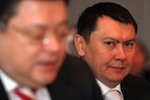 After the court rejected the plea made by three people from Kazakhstan, Satzahn Ibraev, Tyotr Afanasenko and Akezhan Kazhegldin, where they requested the Commissioner of Police to take action against Rakhat Aliyev on crimes against humanity which he committed in Kazakhstan, their lawyer Lothar de Maizière declared that he will appeal this judgment.
After the court rejected the plea made by three people from Kazakhstan, Satzahn Ibraev, Tyotr Afanasenko and Akezhan Kazhegldin, where they requested the Commissioner of Police to take action against Rakhat Aliyev on crimes against humanity which he committed in Kazakhstan, their lawyer Lothar de Maizière declared that he will appeal this judgment.
"We are partly satisfied and partly disappointed. We will appeal the decision. By means of the decision the doors opened a bit wider. In the second stage will present more evidence. We will also introduce the opinion of a German expert on human rights. We believe that we have enough evidence and a strong case to win," said de Maizière.
Dr. Maizière expressed his dismay at the fact that the witnesses were not allowed to give their testimony in Court even though they were present in Court in November.
Dr. Maizière who was also the last Prime Minister of the former East Germany, explains that they came to Malta on other occations in relation to this case. "I felt that I was going up against walls. Today, by means of this judgment, the doors are open a bit wider but they are still not fully open."
In its judgment the Court rejected the application because the applicants who submitted the application failed to prove their case, namely that Aliyev committed crimes against humanity.
In the application it was stated that Ibraev and Afansenko were entrusted to protect Kazhegeldin who was Prime Minister of the Republic of Kazakhstan. The latter had resigned from Prime Minister in 1997 for health reasons but Ibraev and Afasenko contined to ensure the safety of Kazhegeldin.
After retiring, Kazhegeldin formed a new political movement under the name "Republican People's Party of Kazakhstan". As a consequence, Aliev realised that this new party could pose a threat to his political ambitions.
This led to the arrest and torture of lbraev and Afanasenko. This was the beginning of a political persecution triggered by Aliev which led to the termination of the party's political activities.
These events occurred in Kazakhstan, but three persons who submitted the application found a trusted lawyer in Malta since Aliyev resides in Malta.
On his part, the Police Commissioner disagreed with the argument that Aliev is a resident of Malta and therefore there is no reason to conduct an investigation against him as regards the allegations made against him.
Aliev is married to an Austrian citizen and therefore his presence in Malta is also justified by the fact that citizens of the European Union have freedom of movement within the territory of the European Union.
When it came make the decision, the Court of Magistrates presided by Magistrate Antonio Mizzi said that the Commissioner of Police does not have the right to insitute the proceedings requested by Ibraev, Afanasenko and Kazhegeldin. This is because the law states that proceedings should not be instituted for any offence except by the Attorney General or with his consent. In this case it is clear that the Commissioner of Police was not given consent by the Attorney General to institute the procedures requested by the applicants.
Furthermore, the Criminal Court declared that the the testimony of the Commissioner of Police "left much to the imagination of this Court."
It said that "this Court will not prolong this point but it deems that it cannot come to the conclusion that Aliyev is not a resident in Malta."
The Court added that from an analysis of the law, it is clear that Aliyev could have committed crimes against the person but it is a bit difficult to say that he committed crimes against humanity. The Court said that if the three persons who submitted this application wished to win this point, they did not bring sufficient evidence to prove it.
The Court emphasised that "There was no sufficient evidence to determine this point. The applicants did not offer their testimony nor did they present other witnesses to prove the criminal conduct of Aliev".
The Court added that time when Aliyev allegedly committed the offences was between 1997 and 1999, while the crimes against humanity came into force in 2002 by means of Act XXIV.
The Court explained that this act came into force on 13 December 2003.
iNews Malta 23.05.2013




